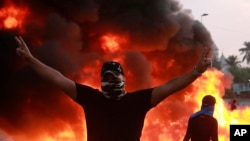ຢ່າງໜ້ອຍ 27 ຄົນໄດ້ເສຍຊີວິດ ແລະຫຼາຍຮ້ອຍຄົນໄດ້ຮັບບາດເຈັບ ຫຼັງຈາກມີການປະ
ທ້ວງຕ້ານລັດຖະບານເກີດຂຶ້ນໃນອາທິດນີ້ ຢູ່ໃນນະຄອນຫຼວງແບັກ ແດດ ແລະບັນດາ
ເມືອງຕ່າງໆ.
ກຳລັງຮັກສາຄວາມສະຫງົບໄດ້ເປີດສາກຍິງໃສ່ພວກປະທ້ວງທີ່ຢູ່ໃກ້ໃຈກາງນະຄອນ
ຫຼວງບ່ອນທີ່ມີຫຼາຍຄົນໄດ້ຮັບບາດເຈັບ ແລະເສຍຊີວິດນັ້ນ. ໄດ້ມີການວາງມາດຕະການ
ຫ້າມບໍ່ໃຫ້ຄົນອອກນອກບ້ານ ແລະຕັດອິນເຕີແນັດຢູ່ໃນຫຼາຍຂົງເຂດໃນຄວາມພະຍາມ
ທີ່ຈະຈຳກັດບໍ່ໃຫ້ນເຂົ້າຫາສື່ສັງຄົມທີ່ລັດຖະບານຕຳໜິວ່າ ກໍ່ໃຫ້ເກີດການປະທ້ວງນັ້ນ
ໄດ້. ສະຫະລັດ ແລະອົງການສະຫະປະຊາຊາດໄດ້ຮຽກຮ້ອງໃຫ້ພວກເຈົ້າໜ້າທີ່ໃຫ້ມີ
ຄວາມອົດກັ້ນ.
ພວກປະທ້ວງຫຼາຍຮ້ອຍຄົນບໍ່ໄດ້ສົນໃຈຕໍ່ການຫ້າມອອກນອກບ້ານຂອງລັດຖະບານ
ໃນວັນພະຫັດວານນີ້ ໂດຍພາກັນອອກໄປຢູ່ຕາມຖະໜົນສາຍຕ່າງໆ ໃນນະຄອນແບັກ
ແດດ ໃນຂະນະທີ່ພວກເຈົ້າໜ້າທີ່ຍິງແກັສນ້ຳຕາ ແລະຍິງປືນໃສ່ເພື່ອຕັກເຕືອນ.
ທ້າວອາບູ ອາລ-ກາສຊິມ ຜູ້ປະທ້ວງໜຸ່ມຄົນນຶ່ງຈາກແບັກແດດກ່າວວ່າ “ເຖິງແມ່ນມີ
ການຫ້າມອອກນອກບ້ານ ຂ້າພະຈົ້າສາບານຕໍ່ໜ້າພະເຈົ້າກໍໄດ້ວ່າ ພວກເຮົາຈະບໍ່ຍອມເພີກຖອຍໄປ. ພວກເຮົາຮຽກຮ້ອງໃຫ້ມີສິດທິອັນງ່າຍໆຂອງພວກເຮົາເທົ່ານັ້ນ.”
ບັນດາສິດທິເຫລົ່ານັ້ນຍັງບໍ່ໄດ້ຮັບການອະທິບາຍຢ່າງຈະແຈ້ງຢູ່ໃນການເດີນຂະບວນ
ທີ່ປາກົດວ່າເກີດຂຶ້ນຢ່າງວ່ອງໄວພ້ອມໆກັນຢູ່ຕາມບັນດາຕົວເມືອງຕ່າງໆ ຢູ່ທົ່ວອີຣັກ,
ທັງຢູ່ໃນເຂດຂອງພວກນິກາຍຊີໄອ (Shi’ite) ແລະນິກາຍ ຊຸນນີ (Sunni.) ການປະ
ທ້ວງໄດ້ເກີດມາຈາກເສດຖະກິດຝືດເຄືອງ ແລະລັດຖະບານ ທີ່ອ່ອນແອ. ພວກປະທ້ວງ
ຫຼາຍຄົນໃຫ້ເຫດຜົນວ່າ ຍ້ອນຂາດວຽກເຮັດງານທຳ ແລະການບໍລິການແບບພື້ນຖານ.
ກຳລັງທະຫານຂອງອີຣັກໄດ້ປະກາດໄຊຊະນະຕໍ່ກຸ່ມລັດອິສລາມໃນປີ 2017. ສອງປີ
ຕໍ່ມາໄດ້ເກີດຄວາມບໍ່ພໍໃຈຕໍ່ການຂາດຄວາມກ້າວໜ້າ.
ອະນາຄົດຂອງອີຣັກພາຍຫລັງທີ່ໄດ້ຊະນະກຸ່ມ IS ແລ້ວ ເປັນຫົວຂໍ້ຂອງການ ຖົກຖຽງ
ກັນຢູ່ໃນການສົນທະນາຂອງອົງການບໍ່ຫວັງຜົນກຳໄລ Chatham House ຢູ່ນະຄອນ
ຫຼວງລອນດອນໃນອາທິດນີ້ທີ່ມີບັນດາຜູ້ຕາງໜ້າກູ່ມຊົນເຜົ່ານ້ອຍ ແລະບັນດາກຸ່ມການ
ເມືອງທີ່ສຳຄັນສາມກຸ່ມ ຄື ກຸ່ມຊູນີ (Sunni), ເຊຍ (Shia) ແລະເຄີດ (Kird) ເຂົ້າຮ່ວມ
ນຳ. ທີ່ປຶກສາຂອງນາຍົກລັດຖະມົນຕີ ທ່ານເລດ ກູບບາ ກ່າວວ່າ ການຕີກຸ່ມລັດອິສລາມ
ໃຫ້ຜ່າຍແພ້ໄປຍັງອາດເປັນຈຸດເຮັດໃຫ້ມີການຫັນປ່ຽນຢູ່ກໍເປັນໄດ້.
At least 27 people have been killed and hundreds injured following anti-government protests this week in Iraq's capital, Baghdad, and other cities.
Security forces opened fire on demonstrators close to the center of the capital, where a number of casualties occurred. A curfew has been imposed and the internet cut off in several regions in an attempt to restrict access to social media, which the government blames for fanning the protests. The United States and the United Nations have urged authorities to exercise restraint.
A few hundred protesters defied a government curfew Thursday on the streets of Baghdad as security forces fired tear gas and warning shots.
"Even with the curfew, I swear to God we will not retreat. We are demanding our simplest rights," said Abu al-Qassim, a young protester from Baghdad.
Those rights remain ill-defined among the apparently spontaneous demonstrations that have erupted in unison in cities across Iraq, in both Shi'ite and Sunni areas. The protests are rooted in Iraq's stuttering economy and weak government. Many demonstrators cite a lack of jobs and basic services.
Iraqi forces declared victory over Islamic State in 2017. Two years later, there is frustration at the lack of progress.
Iraq's post-IS future was the subject of a debate this week at London's non-profit Chatham House, attended by representatives of the three main ethnic and political blocs Sunni, Shia and Kurd. Prime ministerial advisor Laith Kubba said the defeat of Islamic State can still be a turning point.
"There was a very high level of sectarianism. And after what they did in (the city of) Mosul, really, the dynamic has changed in all the western provinces. So today, I think there is a foundation for building a national movement and the agenda has changed," Kubba said.
Sectarian divides still plague the government. Dhiaa al-Sadai, a representative of the powerful Shia cleric Moqtada al-Sadr, said promises of political reform had not been fulfilled.
"The political system is described as decentralized, as a federal system. But in reality there is no federalism, there is no federal government in Iraq. The local governments in most of Iraq do not have the authority that they are supposed to have. They are unable to deliver the expected services because they don't have enough authority."
The northern autonomous region of Kurdistan tried to break away from Iraq through a failed independence referendum in 2017. Kurdistan's interior minister, Karim Sinjari, also an advisor to regional President Nechirvan Barzani, said the foundations of the Iraqi state remain shaky.
"We need some kind of national reconciliation between all the components of the Iraqi people. The Sunni people in Iraq must feel that they are part of Iraq, and they are part of the political decision-making in Iraq."
Iraq's problems are rooted in recent history - but a new generation is desperate to move on, said Kubba, advisor to Iraqi Prime Minister Adel Abdul-Mahdi.
"Iraq has about 20 million young people under the age of 20. Those people are raised with no memory of (Iraq's late dictator) Saddam Hussein, what went on before, all the political issues. And they are not getting the services and schools and hospitals, or in the streets. They are impatient."
That impatience is rapidly turning to anger on the streets. The government urgently requires an answer as the violence escalates.




